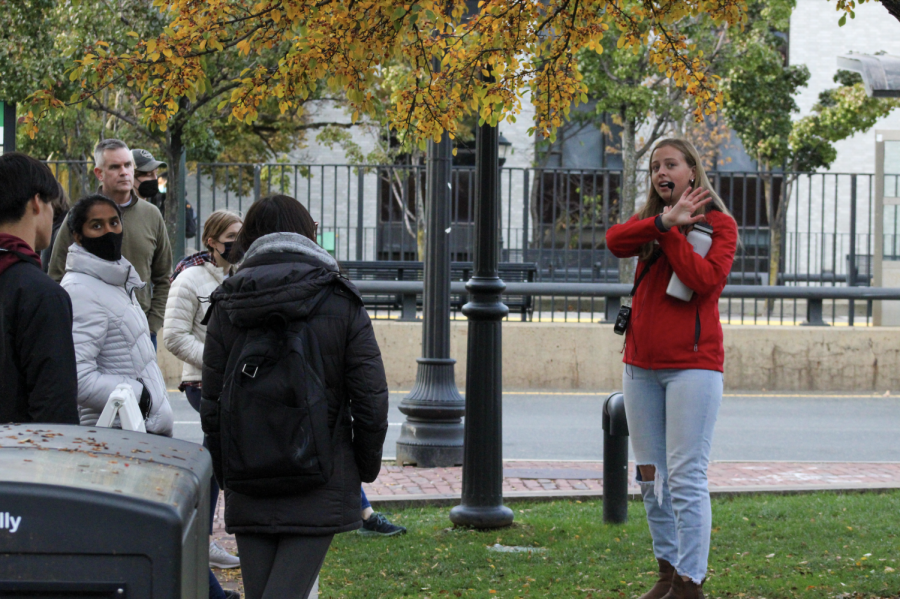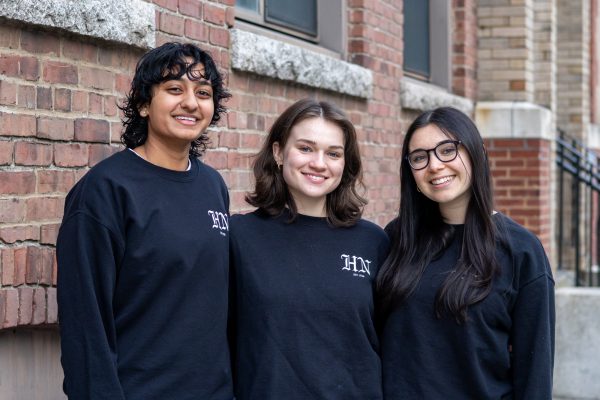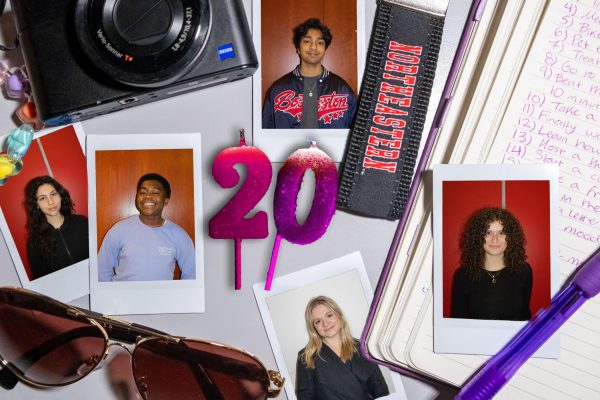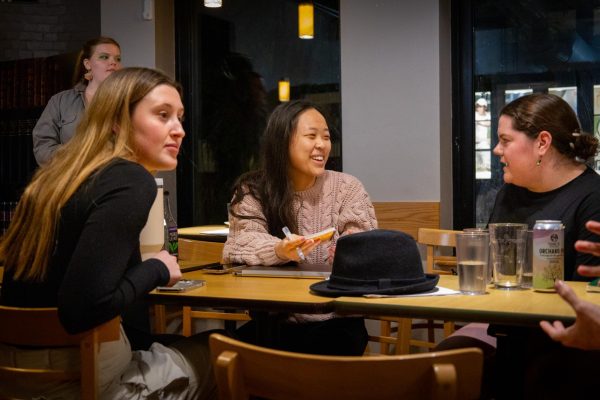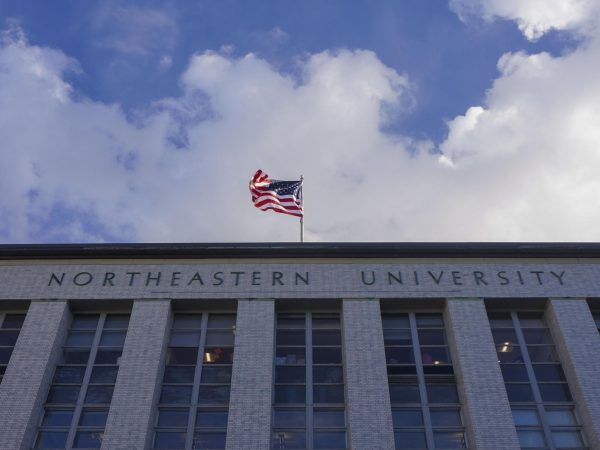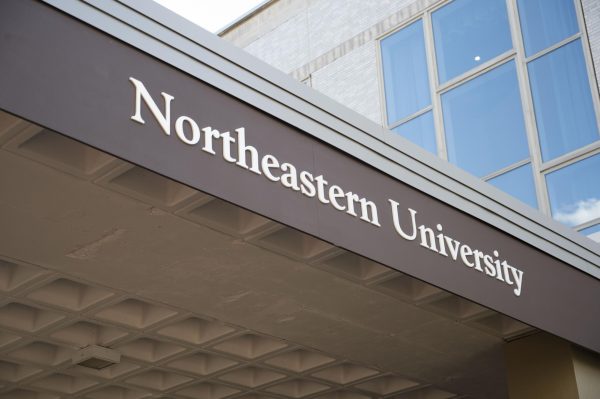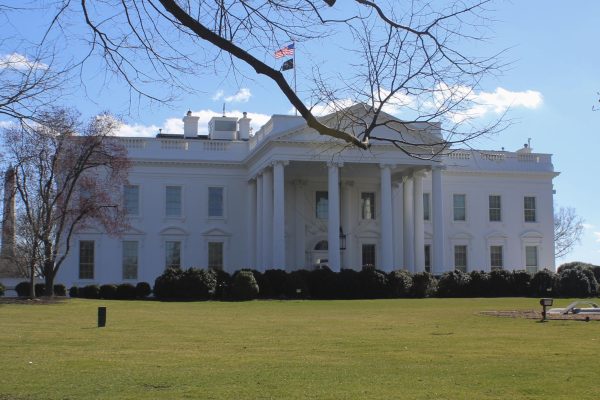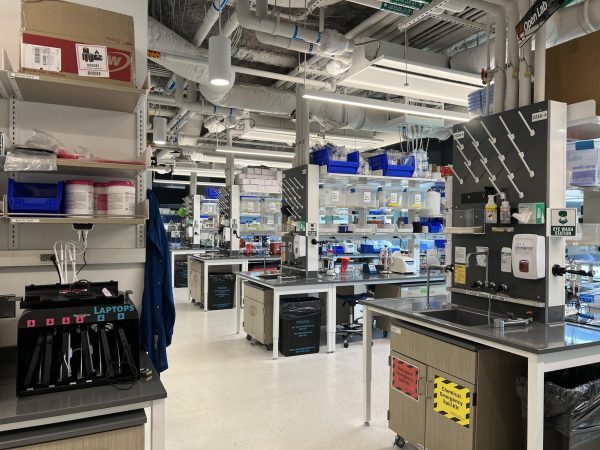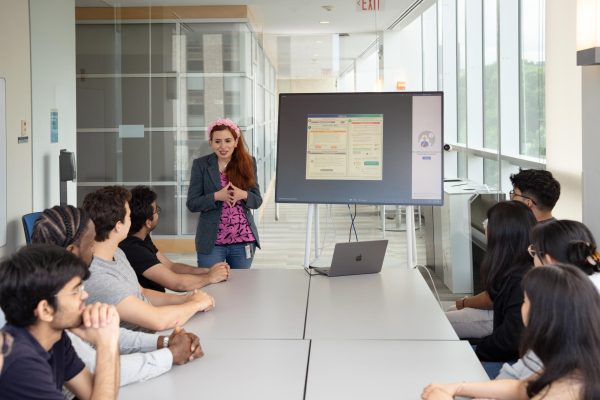Husky Ambassadors voice concerns over vaccination policy for tours
A Husky Ambassador leads a campus tour Nov. 4. Prospective students and their families are asked to attest that they don’t have symptoms of COVID-19 and haven’t been exposed, but no proof of negative COVID-19 test or vaccination is required.
Prospective students and their families visiting Northeastern’s campus for tours are not required to show proof of a negative COVID-19 test or vaccination, a policy some Husky Ambassadors say makes them concerned for their safety.
When guests walk into the Visitor Center for an information session and tour of Northeastern, they are asked a series of questions ranging from if they have any COVID-19 symptoms to if they’ve come into contact with anyone who tested positive for the virus. But some Husky Ambassadors, the undergraduate students who lead campus tours, say this isn’t enough.
“I generally feel pretty comfortable knowing that people are masked and trust that a lot of the people are vaccinated, but also knowing that we are just going by the honor system, you can never be fully sure,” said Alex Jarecki, a Husky Ambassador and fourth-year biology and political science combined major. “It just sort of makes me feel like I’m putting myself more at risk than I really need to be.”
While both Boston and Northeastern require masks indoors, many visitors come from different parts of the country — or even places outside the country — that may have looser restrictions. Husky Ambassador Alison Booth, a fourth-year journalism and interaction design major, checks in guests and said visitors often come up to her with their masks on improperly.
“There’s just this extra level of anxiety among us when we’re working that these people are coming up to me who aren’t wearing masks and I have to remind them to put their masks on,” Booth said. “What if they’re not vaccinated?”
Many Husky Ambassadors say they noticed the disparity in Northeastern’s COVID-19 requirements for visitors when the school announced that guests at Family & Friends Weekend in late October were required to show proof of full vaccination or a negative COVID-19 test result to attend campus events.
“They wanted everyone who was coming for Family & Friends Weekend to be vaccinated or at least be able to produce a negative COVID test, but they made a point, it felt like, to exclude campus tours from that,” Booth said. “I don’t think it’s that huge of a logistical issue to check a vaccination card or a negative COVID test. I would be willing to put in the work to do that”
Ruthie Olowoyeye, a fourth-year health science major and the chair of Husky Ambassadors, said they met with Chancellor and Senior Vice President for Learning Ken Henderson in May 2021 to address concerns about the testing and vaccination requirements for visitors going on Husky Ambassador tours. Henderson said requiring proof of vaccination would be an inconvenience for prospective students and families going on tours, Olowoyeye said.
After the requirements for Family & Friends Weekend were announced, Olowoyeye emailed Henderson to bring up their concerns again but did not receive an answer from him directly, instead receiving an email from Elizabeth Cheron, Northeastern’s dean of admissions. The email summarized the difference between larger-scale indoor events and campus tours, pointing out that visitors are typically indoors for less than an hour and noting that the policy could be revisited as the pandemic develops.
“… It was determined that since admissions visitors are indoors typically for a cumulative time under an hour, this policy does not apply to the current prospective student visit,” the email from Cheron read. “Should the nature of prospective student campus visits change in the future or should the circumstances around the pandemic change in the future, we certainly will revisit this, just as we have adapted to other changes over the past 18 months.”
In an email statement to The News, Marirose Sartoretto, a spokesperson for Northeastern, said the university does not require proof of vaccination or a negative COVID-19 test for individuals taking a Husky Ambassador tour because a tour is considered “a brief campus visit.” Visitors who have a one-time meeting on campus, Sartoretto noted, are not required to show vaccination status or a negative test.
“Individuals who attended parents weekend were considered short-term visitors, which is why they were required to show proof of vaccination or a negative Covid-19 test within 72 hours of being on campus,” Sartoretto said in the email statement.
Husky Ambassadors, including Jarecki, said they wondered why the administration’s policy varied for different campus events.
“I feel like the policy shouldn’t be more difficult to implement than it is for implementing it at Matthews [Arena] for the hockey games,” he said. “The logistics shouldn’t be any more complicated, and it would be a very simple fix to start requiring campus visitors to either be vaccinated or have negative tests.”
After prospective students and their families check in at the Visitor Center, they sit down for an information session that typically lasts 30 minutes, followed by a campus tour. The indoor information sessions have a maximum of 50 attendees Monday through Thursday and 200 on Fridays and Saturdays, Jarecki said. Afterwards, the attendees are broken down into smaller groups of 15 to 25 to embark on campus tours.
When the COVID-19 pandemic shut down Northeastern’s campus in the spring of 2020, Husky Ambassador tours also came to a halt. Virtual tours were conducted in fall 2020, and in-person tours were brought back this past spring, with information sessions returning this fall. However, Husky Ambassadors began getting paid for their work in July 2021, Olowoyeye said.
Jarecki said visitor attendance at Husky Ambassador tours has “pretty much gotten back up to what it was pre-pandemic,” with higher volume days like Fridays and Saturdays attracting 150 to 200 people per session.
But with a rise in visitors comes an increased risk of encountering the virus, and Husky Ambassadors that spoke with The News expressed concern about the risks this presents to the Northeastern and greater Boston community.
“I’ve had people [on tours] who have come from London and Brazil. The fact that people are traveling so far, and we don’t really know what their vaccination status is… it feels that’s more risky,” Jarecki said. “Obviously Massachusetts has a really good vaccination rate but not every state does.”
Visitors to Northeastern’s campus often travel to Boston to see the number of other institutions that make the city a bustling college town, noted Olowoyeye.
“People who are coming from far away are not only coming to Northeastern’s campus, they’re going to [Boston University], they’re going to Harvard, they’re going to MIT, they’re going to Wentworth,” they said. “It’s not like this is an isolated event and these people are going home.”
Some Husky Ambassadors who lead the information sessions say they feel increased risk in information sessions compared to tours, which are largely outdoors and are conducted in smaller groups.
“The information sessions worry me more than the tours themselves,” Jarecki said. “The info sessions could be up to 200 people all in a room together for half an hour at a time which definitely feels way more risky.”
The Delta variant, which is thought to be twice as contagious as past variants of COVID-19, worries Ambassadors like Olowoyeye, especially when interacting indoors with visitors that have an unknown testing and vaccination status.
“You can’t tell me that it’s not a big deal when the Delta variant is predominantly most of the cases that show up in the United States, and when we already know that it’s much more contagious, and it’s much easier to get,” they said. “If you’re not fully vaccinated for some reason, at least show proof of a negative COVID test. That’s just public health policy.”
At a recent organization-wide meeting, Olowoyeye polled Husky Ambassadors to see how they were feeling about visitors not being required to show proof of a negative test or vaccination. Roughly 75% of Ambassadors felt uncomfortable with the policy, Olowoyeye said.
“The overwhelming majority of people are not okay with it and would like for the administration to essentially just be more responsible,” they said. “It’s a weird teetering balance of like: How do I give a good tour, but also know that I’m putting myself at risk when I do this?”
Booth said the policy has forced her to look at how interacting with visitors could impact those around her. When checking guests into the Visitor Center, she said she can interact with hundreds of people on high-volume days.
“I should feel safe when I’m at work — that should be the standard of safety across the scope of the whole university,” she said. “At the same time, I’m going to all my classes and living with my roommates, and I’m like, ‘Oh, do I have to think about this in relation to them?’ I’m trying to be as safe as possible while at the same time the university isn’t doing the same for me.”
Husky Ambassadors that spoke with The News also said they felt their role in attracting prospective students to Northeastern was being ignored.
“We put in a lot of work to make our tours good and make our presentations really good. And that’s us — the students — doing that, that’s not coming from the administration,” Booth said. “So for [the administration] to not put in the work to make sure that we’re safe, I think is just really unfair.”
Olowoyeye said Husky Ambassadors regularly receive praise from students who say the tours make them want to apply to Northeastern.
“We’re the people who bring people to this university,” they said. “I want the administration to know that we are the reason why people choose to come here, because we do great work. We’re important and our lives matter, and our health matters. We just want you to know that we can only do so much if you don’t keep us safe.”
If they decide to attend Northeastern, prospective students will need to comply with Northeastern’s vaccination requirement anyway, Booth said.
“I don’t know if [Northeastern] is trying to not alienate these prospective families, but at the same time we have that overarching mandate regardless if they want to send their kids here,” she said.
Olowoyeye said she questions whether Northeastern’s priorities are focused on prospective students over current students.
“Our health should be a priority and the health of the Northeastern community and the greater Boston community should be your priority, not just the number of people that choose to come to tour, and not your yield, and not the number of applications,” they said. “It should be the safety and the health of not only your students, the Husky Ambassadors, but also the greater Boston area.”
Jarecki has been a Husky Ambassador for two years and said he finds it frustrating that Northeastern is not listening to student concerns.
“It feels like I’ve put in so much time and energy and dedication to Husky Ambassadors,” he said. “Just the fact that we’re putting in so much work for the school and then feeling like they don’t really care about how we feel or our safety, I think is the worst part of this.”


